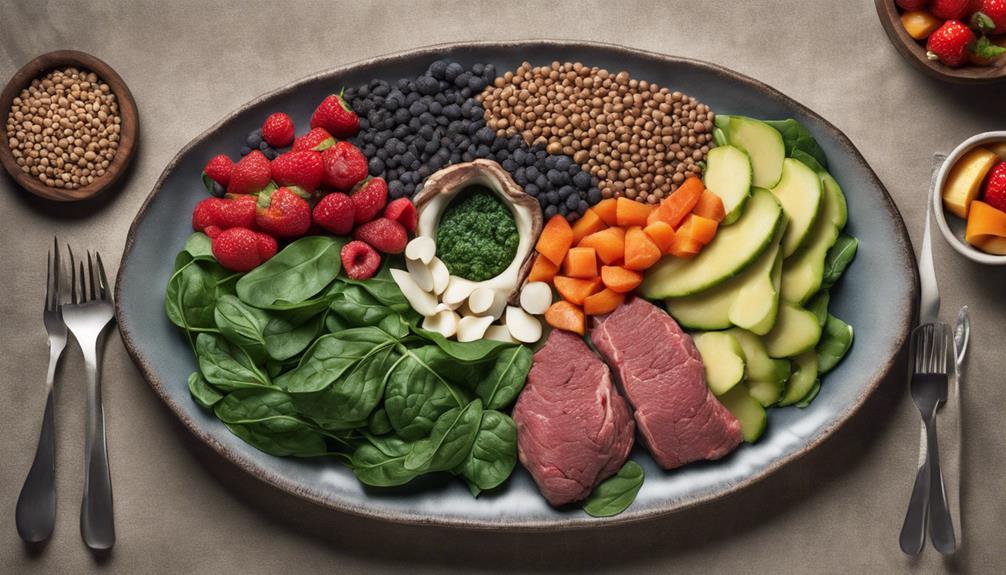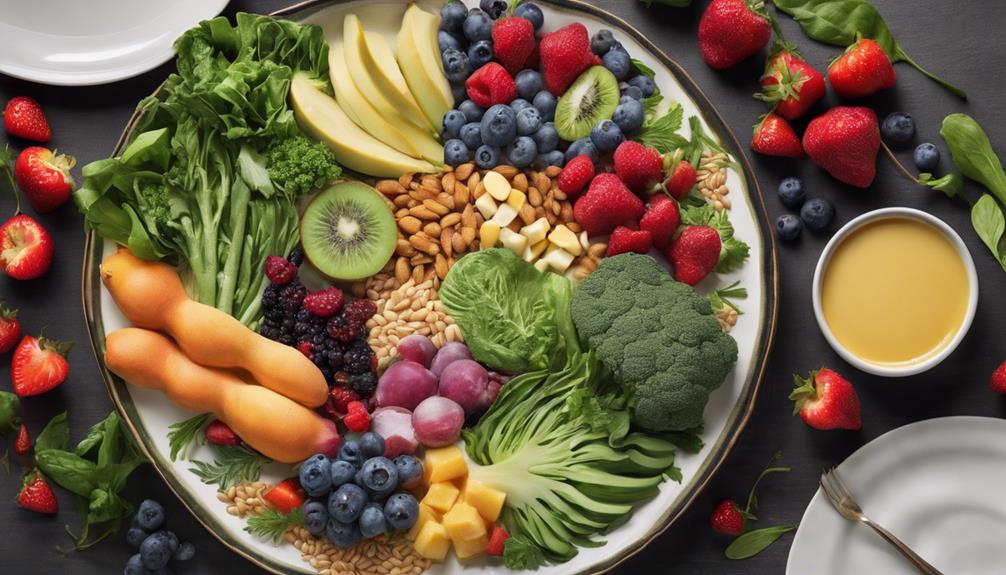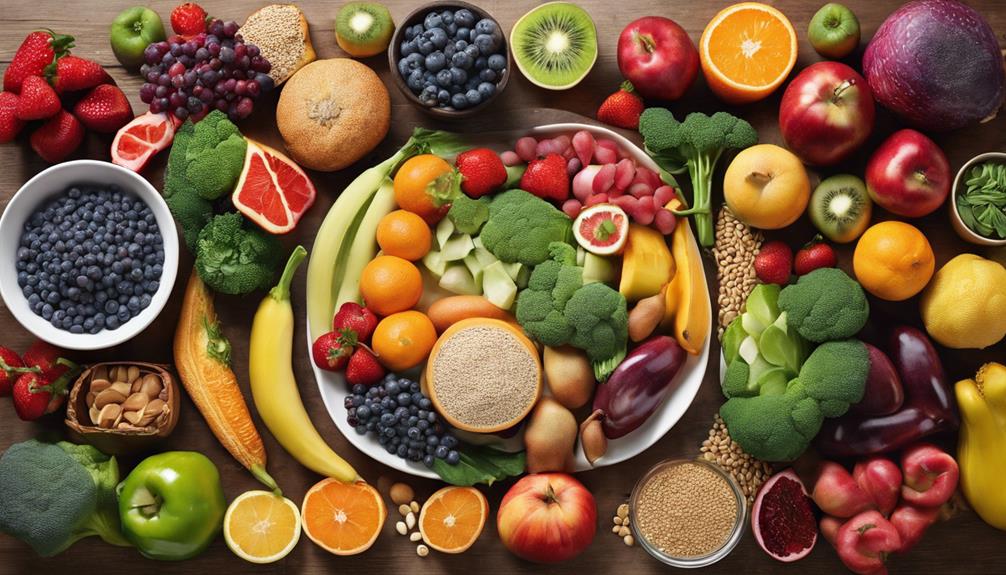As the saying goes, 'you are what you eat,' and when it comes to providing the best for your newborn through breastfeeding, ensuring a good diet is essential. Understanding the essential nutrients for new moms during this period can greatly impact both the mother's health and the baby's development.
So, let's explore the key nutrients that play an important role in supporting a healthy breastfeeding journey and why they are essential for new moms.
Key Takeaways
- Protein aids tissue repair and growth crucial for new moms postpartum.
- Calcium ensures bone health for mother and baby during breastfeeding.
- Omega-3, especially DHA, supports infant brain development and cognitive function.
- Vitamin D and calcium are vital for maintaining bone health in nursing mothers and infants.
Key Nutrients for Breastfeeding Moms
Breastfeeding moms require additional key nutrients such as protein, calcium, iron, iodine, and vitamins to support peak milk production and overall health for themselves and their baby. These essential nutrients play vital roles in ensuring the well-being of both the mother and the infant during the breastfeeding journey.
Protein is essential for tissue repair and growth, aiding in the recovery process postpartum. Calcium is crucial for maintaining bone health, benefiting both the mother and the developing baby. Iron is necessary for red blood cell production, supporting energy levels and preventing fatigue. Iodine plays a significant role in thyroid function, which is essential for metabolism regulation.
Vitamins, with their array of functions, contribute to overall health and immunity for both mother and child. Ensuring a well-balanced diet rich in these nutrients is fundamental to meeting the increased nutritional needs of breastfeeding moms and promoting optimal health outcomes for themselves and their little one.
Importance of Omega-3 for New Moms

Shifting from discussing key nutrients for breastfeeding moms, we now shift our focus to the significance of Omega-3 for new mothers, particularly in supporting infant brain development through essential fatty acids like DHA. Omega-3 fatty acids, including DHA, play an important role in the best development of an infant's brain.
These essential nutrients are transmitted through breast milk, making it important for new moms to make sure an adequate intake of Omega-3 sources like seafood, especially salmon. Studies suggest that a sufficient supply of Omega-3 during breastfeeding can benefit the baby's visual and neurological development.
Moreover, including Omega-3 rich foods in the maternal diet may even enhance cognitive function in infants. By incorporating sources of Omega-3 into your meals, you can help maintain the necessary levels of DHA in your breast milk, supporting your baby's growth and overall development. Prioritizing Omega-3 in your diet can contribute substantially to your baby's health and well-being.
Vitamin D and Calcium for Nursing Moms
Ensuring an adequate intake of essential nutrients like vitamin D and calcium is vital for nursing mothers to support both their own bone health and their baby's development. Vitamin D plays an important role in maintaining bone health for breastfeeding moms and promoting proper bone growth in infants. Breastfeeding women should aim for 600-800 IU of vitamin D daily, as breast milk may not always provide sufficient levels. Good food sources of vitamin D include fortified dairy products, fatty fish like salmon, and nutrient-rich egg yolks.
Additionally, calcium is crucial for nursing moms to support their bone health and assist in their baby's bone development. It's recommended that breastfeeding mothers consume around 1,000 mg of calcium per day. This mineral can be obtained from various sources such as dairy products, leafy greens, and fortified foods. By incorporating these essential nutrients into their diet, nursing mothers can ensure they're meeting their own needs while supporting their baby's development through breast milk.
Iron-Rich Foods for Breastfeeding

Replenishing iron stores and supporting red blood cell production are essential for nursing mothers, making iron-rich foods an important part of their diet during breastfeeding. Iron is vital for breastfeeding moms as they need to replenish stores depleted during pregnancy and support increased red blood cell production for milk production. Good dietary sources of iron for breastfeeding women include lean meats, poultry, fish, beans, lentils, tofu, fortified cereals, and dark leafy greens like spinach and kale. The recommended daily intake of iron for breastfeeding women is 9 mg per day, achievable through a combination of dietary sources and supplements if needed. Iron deficiency can lead to fatigue, weakness, and decreased milk production, highlighting the importance of meeting the recommended iron intake through diet. Including iron-rich foods in the diet can help prevent iron deficiency anemia and support overall health and energy levels during this demanding period.
| Iron-Rich Foods | Iron Content (mg) |
|---|---|
| Lean beef | 3 mg |
| Lentils | 3.3 mg |
| Spinach | 2.7 mg |
Hydration Tips for Nursing Mothers
To maintain best hydration levels while breastfeeding, nursing mothers should prioritize regular fluid intake based on their thirst cues and monitor urine color for signs of dehydration. Dark yellow urine may indicate dehydration, signaling the need for increased fluids.
It's essential for nursing mothers to consume caffeine and sugary drinks cautiously, as these can contribute to dehydration. Limiting caffeinated beverages to 2-3 cups per day can help maintain proper hydration levels.
Monitoring hydration status through urine color and smell is important for breastfeeding mothers to guarantee they're adequately hydrated. By paying attention to these cues and adjusting fluid intake accordingly, nursing mothers can support their own health and well-being while providing for their little ones.
Frequently Asked Questions
What Nutrients Do Breastfeeding Mothers Need More Of?
We need more protein, calcium, iron, Omega-3 fatty acids, and Vitamin D while breastfeeding. These nutrients support milk production, bone health, prevent anemia, aid brain development, and calcium absorption. Meeting these needs helps us and our babies thrive.
What Are the Most Nutritious Foods for Breastfeeding Mothers?
We thrive on lean meats for protein, veggies for vitamins, fruits for fiber, and whole grains for energy. Hydration is key. Our diet supports milk production and keeps us strong. These foods are a must for breastfeeding moms.
What Food Should a New Lactating Mother Have?
We aim to support new lactating mothers with nutrient-rich foods including lean meats, dairy, beans, and seafood to fulfill increased protein needs. Fruits, vegetables, whole grains, and hydration are crucial for milk production and health.
What Nutrients Are Needed to Produce Breast Milk?
We need protein, calcium, iron, iodine, and vitamins to produce nutritious breast milk. These nutrients support our baby's growth and development. A balanced diet rich in these essentials helps us provide the best nourishment for our little ones.
Conclusion
To sum up, ensuring a good diet while breastfeeding is vital for both the mother and baby's health.
Did you know that breastfeeding can burn up to 500 extra calories a day, aiding in postpartum weight loss?
By focusing on essential nutrients like Omega-3, Vitamin D, calcium, and iron, new moms can support their own well-being and provide their little one with the necessary nutrients through breast milk.
Remember to consult with a healthcare professional for personalized guidance on maintaining a healthy diet during breastfeeding.










